D66 Party Leader Rob Jetten (right) received the draft election programme in The Hague on Friday from caretaker Minister for Mining Hans Vijlbrief (centre) and Chairperson of the Permanent Programme Committee Fleur Gräper-van Koolwijk. (D66 photo)
The Dutch Democratic Party D66 wants to give new energy to the collaboration within the Kingdom and assist the Dutch Caribbean in facing its challenges.
“The apologies for the slavery past in 2022 were an important moment for all people in the Kingdom. Together with the six Caribbean islands, we keep working on societal awareness of this past, we continue research that sheds light on the consequences of the slavery past and we tackle the neglect in treaties and laws and regulations.”
This is stated in the draft D66 election programme titled “New energy for the Netherlands” which was presented to political leader and leading candidate of the D66 list in the November 22 elections, Rob Jetten, in The Hague on Friday. Under the heading “We are one Kingdom”, the party dedicated an entire three-page chapter to the Kingdom.
`Aside from the shared past, the Kingdom has a shared future — a future that is based on equality, emancipation, solidarity and mutual trust. From these values, we work together within the Kingdom on sustainable economic development, preserving the unique nature and culture and safeguarding human rights in our democratic constitutional state.”

D66 wants to eliminate the democratic deficit in the decision-taking by the Dutch Second Chamber of Parliament with regard to Kingdom law proposals by giving room to a proportionate voice of the Dutch Caribbean countries.
The registration obligation to vote for residents of the Dutch Caribbean countries for the European Parliament elections has to be eliminated. People should be able to vote at actual voting booths on every island. This way everyone gets to make equal use of their European voting right.
There will be structural financing for the Kingdom scholarship to stimulate exchange of know-how. Together with the autonomous countries, the Kingdom Council of Ministers will draft a multi-year programme for education, safety, sustainability, care, human rights and strengthening the democratic legal order.
D66 acknowledges the many challenges that the Dutch Caribbean faces and wants to jointly tackle these. “Challenges like economic resilience, combating poverty, geopolitical developments and border-transgressing issues in the area of asylum and migration, climate change and undermining put a lot of pressure on government and the execution capacity of all six Caribbean islands. We join forces with the islands to tackle these challenges.”
In the election programme it is stated that the six Caribbean islands and the Netherlands will work on a Kingdom-wide vision for Kingdom relations for 2030. This vision will include sustainable development goals, emancipation and synergy in order to give content to mutual relations.
D66 wants to expand the Inter-Parliamentary Consultation of the Kingdom IPKO with a yearly debate on the state of the Kingdom. The party aims to get Papiamento and Papiamentu included in the European Union Charter as regional languages.
“The autonomous countries deserve a stronger position in the world. We achieve this by giving Aruba, Curacao and St. Maarten a greater role in diplomacy and trade policy for all countries in the Kingdom. The Netherlands will support through foreign policy and remove restrictions to participate in regional or international forums and organisations.”
D66 wants to tie the social minimum and the other social allowances in 2024 to the actual minimum means of subsistence in Bonaire, St. Eustatius and Saba. While the Caribbean Netherlands has been part of the Netherlands for 13 years, it still does not have the same level of facilities as the Netherlands.
“We give priority to the backlog in social security to come to a true equal level of facilities and to combat poverty. Local self-governance needs to be in the hands of the people. In conformance with the deadline from the Law on Restoration of Facilities for St. Eustatius, we terminate the governmental intervention no later than September 1, 2024, whereby democracy is returned to the Statia people.”
According to D66, the catching-up exercise for Bonaire, St. Eustatius and Saba in the area of regulation and legislation needs to continue and the public entities need to get more authority. A plan of approach will be jointly drafted to improve the capabilities of the island governments.
Sustainability and climate adaptation are important issues for D66. “We are proud that Saba was the first place in the Kingdom where energy is 100% sustainably generated. In that spirit, we keep working on sustainability and climate adaptation.”
The election programme will be voted on by the D66 members during a congress on October 21.
The Daily Herald.
 Saba News News and Information from Saba Island, Dutch Caribbean
Saba News News and Information from Saba Island, Dutch Caribbean